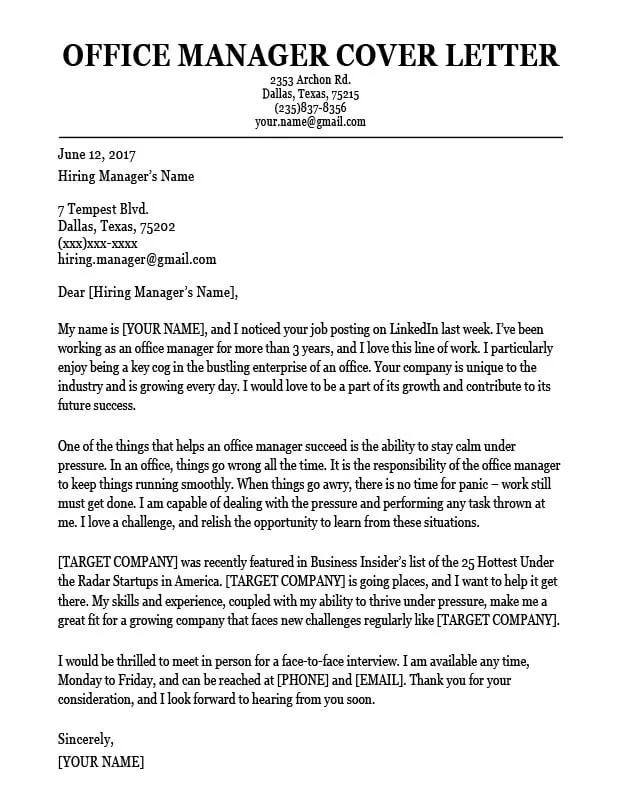Crafting a Compelling Cover Letter
A cover letter is your first opportunity to make a strong impression on a potential employer. It’s more than just a formality; it’s a critical document that can significantly influence whether you get an interview or not. Unlike your resume, which provides a summary of your work history and skills, a cover letter allows you to express your personality, demonstrate your enthusiasm for the role, and highlight why you are the perfect fit for the company. A well-written cover letter grabs the reader’s attention from the outset, conveying your understanding of the company’s needs and your ability to address them. This guide will walk you through the key components of creating a cover letter that impresses, increasing your chances of landing your dream job as an Office Manager. Remember, the goal is to showcase your unique value and convince the hiring manager that you’re the best candidate.
Understanding the Role of an Office Manager
Before you start writing your cover letter, it’s crucial to fully grasp the responsibilities and requirements of an Office Manager. An Office Manager plays a pivotal role in ensuring the smooth and efficient operation of an office environment. They act as the central hub, coordinating administrative tasks, managing office resources, and supporting the needs of employees. This role often involves a wide range of duties, from overseeing office budgets and vendor relationships to managing office equipment and maintaining a professional atmosphere. A deep understanding of these multifaceted responsibilities allows you to tailor your cover letter to demonstrate how your skills and experience specifically align with the demands of the position. By showcasing your comprehension of the role, you will immediately impress the hiring manager and make them believe you are a good fit.
Key Responsibilities of an Office Manager
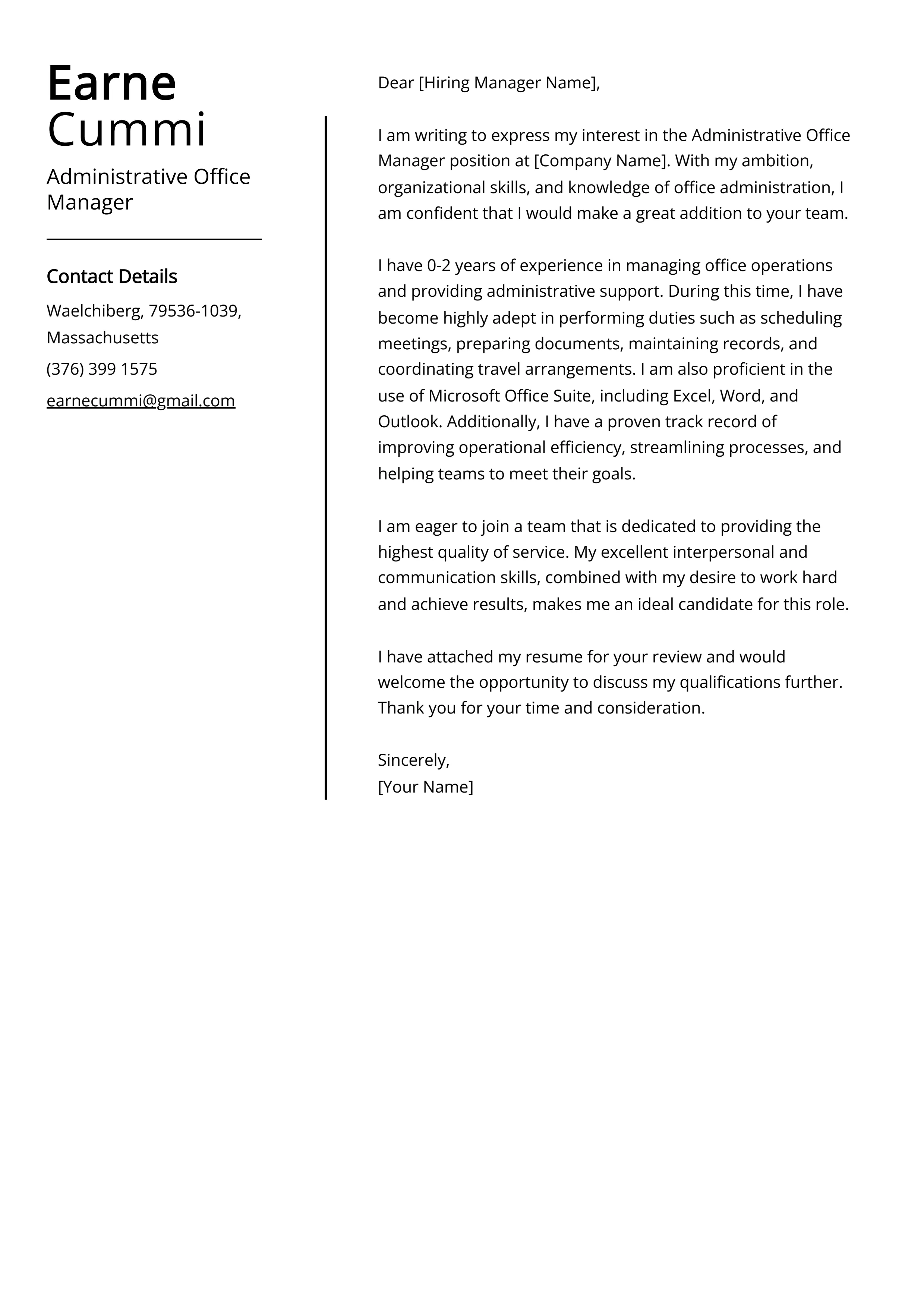
An effective cover letter highlights your ability to handle the core responsibilities of an Office Manager. These responsibilities can be broadly categorized into administration, organization, and communication. Administrative duties often include managing office budgets, negotiating with vendors, and overseeing procurement of office supplies. Organizational tasks involve maintaining office systems, scheduling meetings, and coordinating travel arrangements. Strong communication skills are essential for handling correspondence, interacting with clients, and liaising with various departments. Your cover letter should emphasize your proficiency in these key areas, providing specific examples of how you’ve successfully managed these responsibilities in previous roles. Highlighting these abilities makes you a more competitive candidate. Think about the different responsibilities and explain how your experience has prepared you for them.
Highlighting Relevant Skills and Experience
Your cover letter is the perfect place to showcase the skills and experience that make you a standout candidate. Don’t just list your skills; demonstrate how you’ve applied them to achieve results. Use action verbs to describe your accomplishments, such as ‘managed,’ ‘coordinated,’ ‘streamlined,’ or ‘improved.’ For example, instead of saying ‘managed office supplies,’ you could write ‘Managed office supply inventory, reducing costs by 15% through strategic vendor negotiations.’ This type of specific, quantifiable evidence will capture the hiring manager’s attention and make your application much more memorable. Always align your highlighted skills with the specific requirements mentioned in the job description to demonstrate that you understand what the employer is looking for. This targeted approach significantly increases your chances of getting an interview.
Essential Skills for an Office Manager
Office Managers need a diverse set of skills to excel. Your cover letter should highlight your proficiency in these essential areas. Strong organizational skills are crucial for managing schedules, coordinating projects, and maintaining office systems. Excellent communication skills, both written and verbal, are vital for interacting with colleagues, clients, and vendors. Proficiency in relevant software, such as Microsoft Office Suite (Word, Excel, PowerPoint, Outlook) and potentially other office management tools, is also a must. Leadership skills are important for supervising staff and fostering a positive work environment. Problem-solving abilities are essential for addressing issues and finding effective solutions. Your cover letter should not just mention these skills, but should provide specific examples of how you have utilized them to solve problems or achieve success in previous roles. This makes your application more convincing.
Experience to Showcase in Your Cover Letter
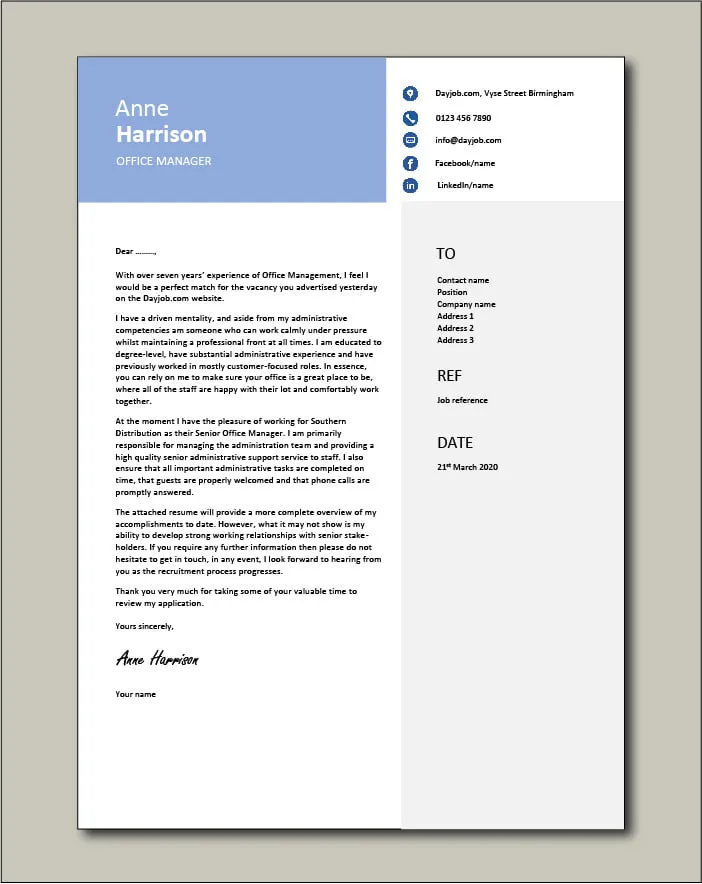
When describing your experience, focus on the most relevant aspects that align with the Office Manager role. Highlight previous experience in office administration, management, or related fields. Showcase your ability to manage budgets, coordinate projects, and handle vendor relationships. Provide specific examples of how you have improved office efficiency, reduced costs, or enhanced employee satisfaction. Quantify your achievements whenever possible, using numbers and data to illustrate your impact. For example, mention any instances where you successfully implemented new office procedures, streamlined administrative processes, or resolved workplace conflicts. This demonstrates your ability to bring tangible value to the company. Emphasize any experience in leadership, such as supervising staff or managing teams, and outline the responsibilities you held in previous positions.
Formatting Your Cover Letter for Impact
The format of your cover letter is as important as its content. A well-formatted cover letter is easy to read and makes a strong first impression. Use a professional font, such as Times New Roman, Arial, or Calibri, with a font size between 10 and 12 points. Keep your letter concise, aiming for no more than one page. Use clear headings and subheadings to break up the text and make it easier for the reader to scan. Use bullet points to list key skills and accomplishments. Always include your contact information (name, phone number, email address, and LinkedIn profile URL) at the top. Ensure that your letter is properly aligned and has consistent spacing. Finally, pay close attention to the overall layout to make sure it looks clean, professional, and visually appealing. Proper formatting shows attention to detail, which is a crucial trait for an Office Manager.
Choosing the Right Tone and Language
The tone and language you use in your cover letter should be professional, confident, and enthusiastic. Avoid using overly casual language or slang. Use a positive and proactive tone throughout the letter. Demonstrate your enthusiasm for the role and the company by expressing your genuine interest. Research the company’s culture and tailor your language accordingly. Use action verbs to describe your skills and accomplishments. Proofread your cover letter carefully to eliminate any grammatical errors or typos. Make sure the language aligns with the job description and the company’s values. A well-written cover letter uses language that makes you stand out from the crowd. The correct tone and language make your application more convincing and professional.
Tailoring Your Cover Letter to the Job
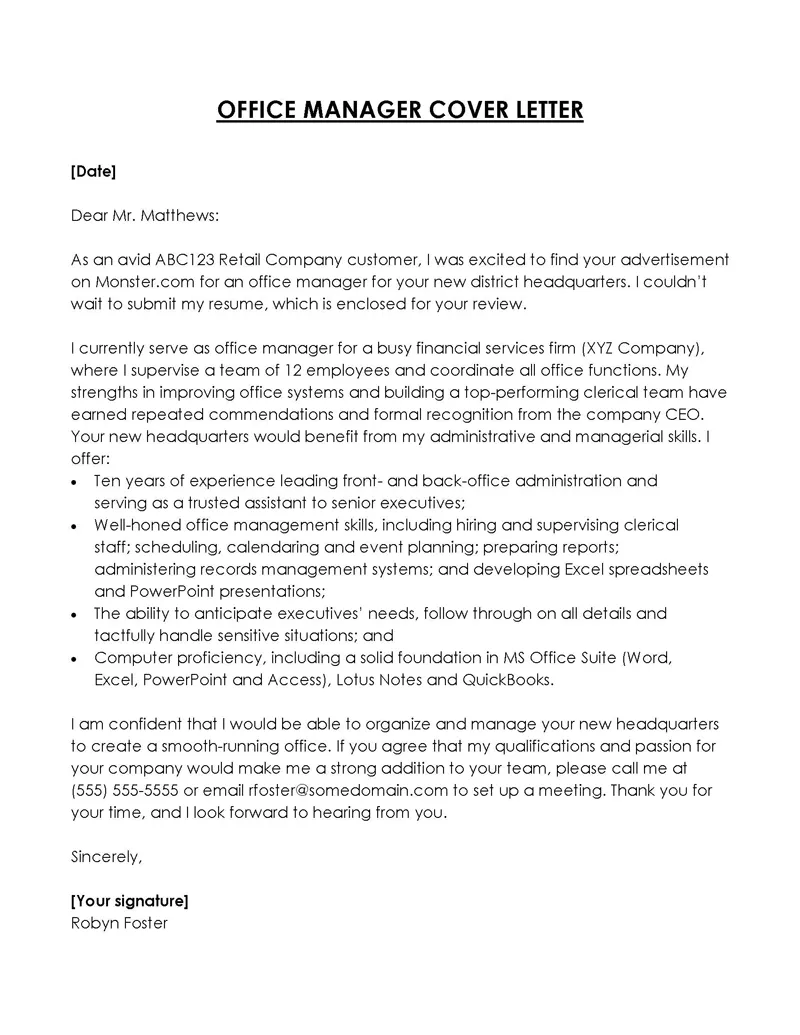
Customizing your cover letter for each job application is essential. Avoid using a generic cover letter; instead, tailor it to each specific position and company. Carefully review the job description and identify the key skills, qualifications, and requirements. Highlight how your skills and experience align with these specific needs. Research the company and the role to understand their values, culture, and goals. Address the hiring manager by name if possible, which shows that you have taken the time to research. Personalize your letter by mentioning specific projects, initiatives, or challenges that resonate with the company’s mission. This demonstrates that you are genuinely interested in the role and have considered how you can contribute to the organization’s success. A customized cover letter significantly increases your chances of getting an interview.
Researching the Company and the Hiring Manager
Before you start writing your cover letter, take the time to research the company and, if possible, the hiring manager. Visit the company’s website, read their mission statement, and review their recent news and initiatives. This will give you a better understanding of their values, culture, and goals. If you can find the name of the hiring manager, address the letter to them directly. Look for the hiring manager on LinkedIn or other professional platforms to gain insights into their background and experience. Mentioning specific details about the company or the hiring manager demonstrates your genuine interest and initiative. This research will enable you to tailor your cover letter to show how your skills and experience align with the company’s specific needs and values, making it more compelling and memorable.
Emphasizing Achievements and Quantifiable Results
To make your cover letter stand out, focus on highlighting your achievements and quantifying your results. Instead of simply listing your job responsibilities, provide specific examples of how you have made a positive impact in previous roles. Use numbers, data, and metrics to illustrate your accomplishments. For example, instead of writing ‘Improved office efficiency,’ write ‘Improved office efficiency by streamlining administrative processes, resulting in a 15% reduction in processing time.’ Quantifying your achievements helps the hiring manager understand the value you can bring to their company. Be specific and provide concrete examples of how you have exceeded expectations, solved problems, and achieved positive outcomes. This makes your claims more credible and demonstrates your ability to deliver results in an Office Manager position.
Showcasing Problem-Solving and Leadership Abilities
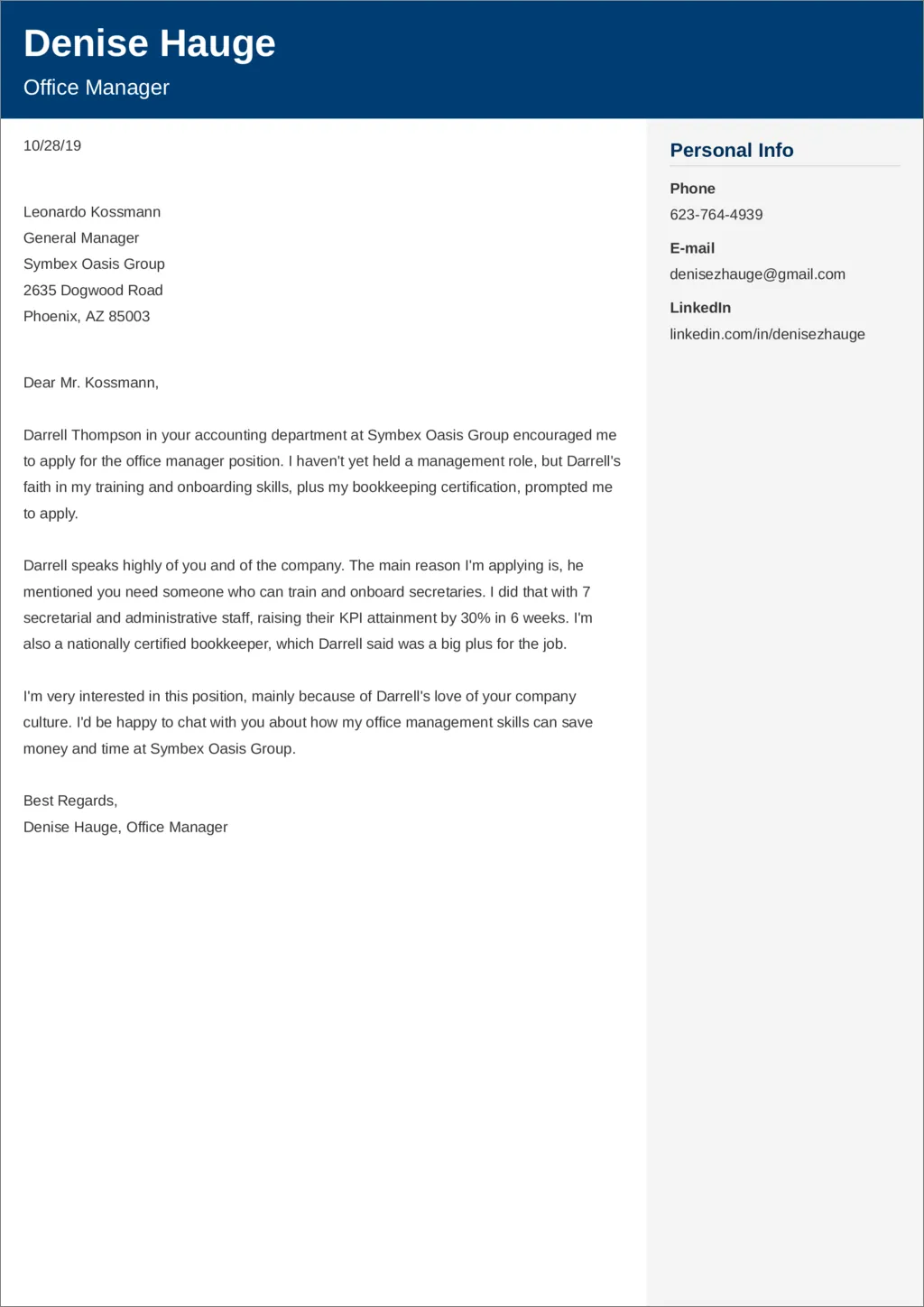
Office Managers often face a variety of challenges. Your cover letter should demonstrate your ability to solve problems and lead effectively. Provide examples of how you have successfully addressed challenges in previous roles. Describe a specific problem you faced, the steps you took to resolve it, and the positive outcome. This showcases your critical thinking, resourcefulness, and ability to make sound decisions under pressure. If you have experience in leading or supervising a team, highlight your leadership abilities. Provide examples of how you have motivated, mentored, or guided your team members to achieve common goals. Emphasize your ability to foster a positive work environment, resolve conflicts, and promote teamwork. Demonstrate your strong leadership abilities to gain the attention of the hiring manager.
Proofreading and Editing Your Cover Letter
Before submitting your cover letter, take the time to proofread and edit it carefully. Errors in grammar, spelling, or punctuation can damage your credibility and make a negative impression. Read your letter multiple times, and consider using a grammar checker or spell checker to identify any mistakes. Ask a friend or colleague to review your letter for clarity, accuracy, and overall effectiveness. Ensure that your letter is well-organized, easy to read, and free of any typos or inconsistencies. Pay close attention to the tone and language, ensuring that it is professional, confident, and appropriate for the role. Proofreading demonstrates attention to detail, which is essential for an Office Manager. A polished, error-free cover letter increases your chances of making a positive impression and securing an interview.
